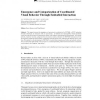Free Online Productivity Tools
i2Speak
i2Symbol
i2OCR
iTex2Img
iWeb2Print
iWeb2Shot
i2Type
iPdf2Split
iPdf2Merge
i2Bopomofo
i2Arabic
i2Style
i2Image
i2PDF
iLatex2Rtf
Sci2ools
133
Voted
AROBOTS
1998
1998
Emergence and Categorization of Coordinated Visual Behavior Through Embodied Interaction
This paper discusses the emergence of sensorimotor coordination for ESCHeR, a 4DOF redundant foveated robot-head, by interaction with its environment. A feedback-error-learning(FEL)-based distributed control provides the system with explorative abilities with reflexes constraining the learning space. A Kohonen network, trained at run-time, categorizes the sensorimotor patterns obtained over ESCHeR’s interaction with its environment, enables the reinforcement of frequently executed actions, thus stabilizing the learning activity over time. We explain how the development of ESCHeR’s visual abilities (namely gaze fixation and saccadic motion), from a context-free reflex-based control process to a context-dependent, pattern-based sensorimotor coordination can be related to the Piagetian ‘stage theory’.
AROBOTS 1998 | ESCHeR’s Visual Abilities | Pattern-based Sensorimotor Coordination | Sensorimotor Coordination |
| Added | 21 Dec 2010 |
| Updated | 21 Dec 2010 |
| Type | Journal |
| Year | 1998 |
| Where | AROBOTS |
| Authors | Luc Berthouze, Yasuo Kuniyoshi |
Comments (0)

